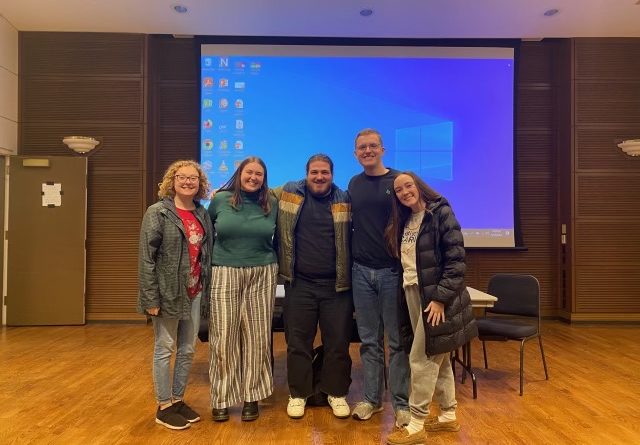Making the English major and minor more inclusive
The English Student Advisory Board at their town hall meeting in Sears Hall. Pictured from left to right: Marissa Mark, Eden Michelson, Phillip Cicero, Ethan Imes and Skylar Sharkey. Photo by Mark.
Tori Miller | News Editor
The English department aims to keep the “human” in humanities through diversity, equity and inclusion. To better help understand the concerns of students while strengthening the bond between faculty and students alike, the department created their first ever Student Advisory Board (SAB) to help bridge the gap.
On Jan. 19 the English Student Advisory Board held their first town hall-style meeting in Sears Recital Hall, inviting majors and minors to use their voices. SAB members include undergraduate students Marissa Mark, Eden Michelson, Skylar Sharkey, Phillip Cicero and Ethan Imes. The group’s mission is simple: they want to provide the best experience possible for all English students, faculty and staff.
Michelson, a junior, said that within the board there are no specific positions and the work is split up evenly. It’s crucial that English students are able to be offered more opportunities to connect with those who share the same passions, whether this is through academic or social programs, she said.
At their first town hall meeting, the board took a few minutes to introduce themselves and their goals for the future. After initial introductions, they opened up the floor to any students who wanted to propose their own thoughts, ideas or concerns.
“Through our meeting discussions, the board has come to the conclusion that English majors and minors seem to feel a bit disconnected from one another,” junior Sharkey said. “Creating spaces and opportunities for English majors and minors to meet and grow closer will create a more cohesive sense of community within the department.”
Mark, a senior, said she wants to institute opportunities for English majors and minors to meet outside of the classroom. By having a space to congregate, English students can meet more of their peers, she said.
Associate professor of English and Director of Undergraduate Studies Patrick Thomas had the initial idea for the student-directed advisory board. He said the inspiration stemmed from a desire to incorporate student perspectives into decision making and show that the department values student experiences.
“One of the things that we want to do in the interest of inclusion is to make sure that if all of these decisions are being made about students [then] students should be included,” Thomas said. “If we say we’re acting in the best interest of students, we should make sure that our students concur, right?” he added.
The process for developing a proposal and its ultimate approval started in the fall of 2021. Thomas led the charge, consulting with current students and solicited feedback on the proposal draft. Once Thomas and the rest of the Undergraduate Curriculum Review Committee revised the proposal, they presented it to the English department’s executive committee and then to the full faculty at a subsequent department meeting.
After the proposal was signed, two faculty members — assistant professor Liz Hutter and professor Tereza Szeghi — volunteered their time to assist with the Student Advisory Board. The two, alongsideThomas, worked on an application process for students to apply to be a representative on the board.
English students in all capacities were reached out to and encouraged to apply if they were interested. At the end of the spring 2022 semester, the first five board members were selected and thrust into the brainstorming process shortly thereafter.
“I think it’s important for students to recognize that just as much as we need good teaching faculty and researchers in our department, we need committed students,” Thomas said. “Students who are not only committed to their own learning, but committed to making our department community better.”
The board’s first intergroup meeting of the year was in September where they covered topics such as clarifying the role of the board, sorting out logistics around communication and brainstorming initiatives to prioritize for the rest of the academic year. Szeghi and Hutter don’t always attend the board meetings, but when they do, it is usually to provide guidance with implementing something the board wants to do.
Hutter and Szeghi spoke on the importance of student leadership and collegiate experiences.
“Students having a leadership position within the department offers vital and unique opportunities for them to shape the English major experience in ways that are most meaningful to them and their peers,” Szeghi said. “Faculty will not always know the types of activities and topics interesting to students in terms of extra curricular engagement, and hearing directly from students allows us to support them.”
Hutter said it’s crucial for students to feel a sense of belonging in their academic department and that this is the key to the growth and livelihood of the English department.
“When a student identifies as an English major or an English minor, I want that to mean something more than a list of literature and writing courses they have taken,” she said.
The SAB meets every three weeks on Sunday and are currently planning when their next town hall meeting will be held. In the future, they hope to incorporate new objectives such as faculty meet-and-greets, helping with student-run publications like Orpheus, launching a newsletter and other social media platforms, and hosting social events such as read-a-thons and book fairs.
Have a question or idea for the English department? Reach out to board members via email EnglishSAB@udayton.edu.
For more campus news, like Flyer News on Facebook and follow us on Twitter (@FlyerNews) and Instagram (@flyernews).

